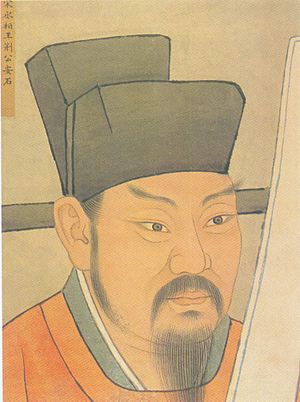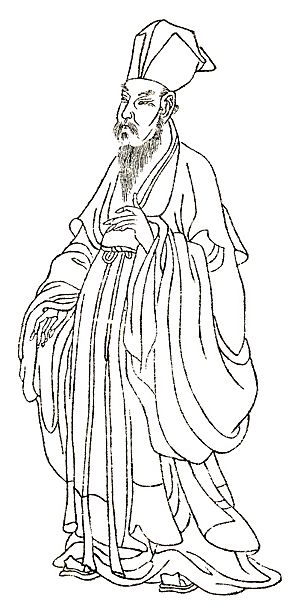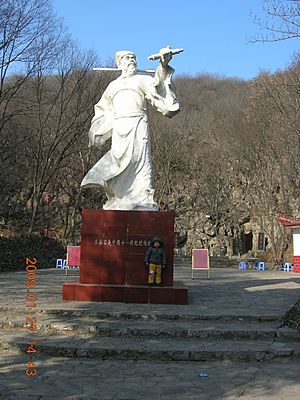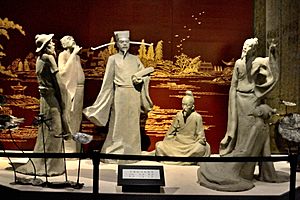Wang Anshi facts for kids
Quick facts for kids Wang Anshi |
|
|---|---|
 |
|
| Chancellor of the Song dynasty | |
| In Office | 1070–1074;1075–1076 |
| Monarch | Emperor Shenzong |
| Born | 8 December 1021 Linchuan, Song |
| Died | 21 May 1086 (aged 64) Jiangning |
| Father | Wang Yi |
| Occupation | Economist, philosopher, poet, politician |
| Wang Anshi | |||||||||||||||||||||||||||||
|---|---|---|---|---|---|---|---|---|---|---|---|---|---|---|---|---|---|---|---|---|---|---|---|---|---|---|---|---|---|
"Wang Anshi" in Chinese characters
|
|||||||||||||||||||||||||||||
| Chinese | 王安石 | ||||||||||||||||||||||||||||
|
|||||||||||||||||||||||||||||
| Posthumous name | |||||||||||||||||||||||||||||
| Traditional Chinese | 文 | ||||||||||||||||||||||||||||
|
|||||||||||||||||||||||||||||
| Title (Duke of Jing) | |||||||||||||||||||||||||||||
| Traditional Chinese | 荊國公 | ||||||||||||||||||||||||||||
| Simplified Chinese | 王荊公 | ||||||||||||||||||||||||||||
|
|||||||||||||||||||||||||||||
| Art name | |||||||||||||||||||||||||||||
| Traditional Chinese | 半山老人 | ||||||||||||||||||||||||||||
| Simplified Chinese | 半山老人 | ||||||||||||||||||||||||||||
|
|||||||||||||||||||||||||||||
| Courtesy name | |||||||||||||||||||||||||||||
| Traditional Chinese | 介甫 | ||||||||||||||||||||||||||||
| Simplified Chinese | 介甫 | ||||||||||||||||||||||||||||
|
|||||||||||||||||||||||||||||
Wang Anshi (born December 8, 1021 – died May 21, 1086) was a very important person in Chinese history. He was an economist, a thinker, a poet, and a politician during the Song dynasty. He became the chancellor, which is like a prime minister.
Wang Anshi tried to make big changes to how society and the economy worked. These changes were called the New Policies. They were very debated and caused a lot of discussion. His ideas were the main ones for the "Reformers" group. They were against another group called the "Conservatives," who were led by Chancellor Sima Guang.
Wang Anshi's ideas often came from old Chinese texts like the Rites of Zhou or Legalism. His economic changes included using more money, stopping private groups from controlling everything, and having the government help manage the economy and social welfare. He also changed the military to use more local groups. In government, he made the civil service exams fairer and tried to stop people from giving jobs to family members (nepotism). Even though his ideas worked for a while, he eventually lost the emperor's support.
| Top - 0-9 A B C D E F G H I J K L M N O P Q R S T U V W X Y Z |
Early Life and Career
Wang Anshi was born on December 8, 1021. His family lived in Linchuan, which is in Jiangxi province. Many people in his family had a special degree called jinshi, which meant they passed a high-level exam.
In 1042, Wang Anshi also passed this exam, coming in fourth place. He started working for the Song government. He had many different jobs in various parts of China. For example, he worked as a secretary and later as a district leader in Yinxian. There, he helped improve water systems for farming and gave loans to farmers.
He moved up in his career, taking on more important roles. In 1060, he went to Kaifeng, which was the capital city. He worked in different financial and administrative offices. After a period of mourning for his mother from 1063 to 1066, he became the governor of Jiangning in 1067.
Wang Anshi's New Policies
Wang Anshi's time working in local government helped him understand the problems that regular people and local officials faced.
Why New Policies Were Needed
In 1058, Wang Anshi wrote a very long letter to Emperor Renzong of Song. In this letter, he suggested ways to fix financial and organizational problems in the government. He said that past dynasties failed because their emperors didn't want to try new ways of ruling. He also thought the imperial exam system wasn't good enough because it didn't help people become experts in specific jobs. Wang believed people should specialize, not just learn a little bit about everything.
His letter was ignored for ten years. But then, Emperor Shenzong of Song became emperor in 1067. The new emperor saw that tax money was going down, and common people had to pay more and more taxes. This was because rich landowners were finding ways to avoid paying their fair share. So, Emperor Shenzong asked Wang Anshi for advice in 1069. Wang was first made a vice-chancellor, and a year later, he became the chancellor.
What the New Policies Aimed For
The main goals of Wang Anshi's New Policies (called xinfa) were to:
- Spend less government money.
- Make the military stronger in the north.
To do this, Wang wanted to help farmers and stop large land owners from getting too much land. He believed these big landowners, called jianbing (meaning "engrossers"), were taking advantage of others. These "engrossers" were people who controlled land and money, making others depend on them. Wang thought stopping them was very important. This group included rich landowners, people who loaned money at high interest rates in the countryside, big city business owners, and people who made prices unstable in cities. Many of these people had connections to government officials.
Wang Anshi believed that the government should manage money well. He said, "The state should take the entire management of commerce, industry, and agriculture into its own hands, with a view to succoring the working classes and preventing them from being ground into the dust by the rich." He thought that if the government didn't manage wealth properly, even ordinary people without political power would try to control the economy for their own greed.
How the Policies Were Put into Action
Wang Anshi became vice-counselor in 1069 and then chancellor. He started many reforms, known as the New Policies or New Laws. These reforms had three main parts:
- Government money and trade.
- Defense and keeping social order.
- Education and making government better.
Fair Land Tax Law
This law, also called the square field law, was about registering land to find hidden land that wasn't being taxed. Land was divided into squares, and officials checked the land quality. This information was used to set a fair tax value. This law was not popular with landowners because it limited how they could use their land and avoid taxes. It was mostly used around Kaifeng and was stopped in 1085.
Green Sprouts Law
The green sprouts law offered loans to farmers. The government loaned money or seeds to farmers at a low interest rate of 2 percent. Farmers would pay back the loans in the summer and winter. However, some officials misused this system, forcing loans on farmers or charging more interest.
Water Works Law
This law aimed to improve irrigation systems. Instead of using forced labor, officials would loan money from local treasuries so people could hire workers for water projects. The government also encouraged planting mulberry trees to help silk production.
Hired Labor Law
This law changed how people paid their labor tax. Instead of working for the government for free (corvée labor), people could pay money. This increased tax income for the government. However, some people who used to be exempt from labor service now had to pay, so they protested. This system continued until the end of the Northern Song dynasty in 1127.
Balanced Delivery Law
This law aimed to control the prices of goods the government bought and to manage local government spending. Financial offices in southeast China were in charge of buying goods and transporting them. The central government bought cheap goods where they were available and stored them to sell in areas where prices were high. Critics said Wang was trying to compete with merchants.
Market Exchange Law
This law targeted large trading companies and monopolies. A special office was set up in Kaifeng and other cities to deal with merchants and set prices. The government bought extra goods and stored them to sell later at lower prices, which stopped merchants from unfairly controlling prices. Merchant groups that worked with the government could sell goods to the government and buy from government stores using money or credit with 10 percent interest for six months. This system also lasted until the end of the Northern Song dynasty in 1127.
Baojia Law (Local Defense)
The baojia system was designed to improve local security and reduce the government's work. It organized groups of ten, fifty, and five hundred men for security. Each group had a leader. Initially, every household with more than two adult men had to provide one security guard, but this was later changed to one per five households. These groups acted like local police, organized night watches, and trained in martial arts when they weren't farming. This helped the government save money because local people were responsible for their own protection.
General and Troops Law
This law aimed to improve the relationship between high officials and regular soldiers. The army was divided into larger units of 2,500 to 3,000 men. These units included different types of soldiers like infantry, cavalry, and archers, instead of each type being in its own separate unit. This system continued until the end of the Song dynasty.
Three College Law (Education Reform)
This law changed how future officials were educated at the National University (Taixue). It divided the university into three colleges: Outer, Inner, and Superior. The goal was to give students a more balanced education and not just focus on Confucian teachings. Students learned one Confucian classic, plus math and medicine. Students could move up through the colleges by passing exams. Those who did very well in the Inner College exams could get government jobs directly, just like those who passed the metropolitan exam.
In 1104, local exams were stopped, and the three-college system was used instead. This meant each area had to send a certain number of students to the Taixue each year. Some officials criticized this, saying it helped the rich and young, and was less fair because relatives of officials could join without exams. The local three-college system was stopped in 1121, but it stayed at the national level.
Wang Anshi's Downfall
Wang Anshi's reforms caused political groups to form in the court. His group, the "Reformers," was opposed by the "Conservative" ministers, led by the historian and Chancellor Sima Guang. When one group gained more power, they would remove rival officials and send them to work in far-off parts of the empire. A famous poet named Su Shi was even jailed and sent away for criticizing Wang's reforms.
Sima Guang and his friends were against the reforms because of money issues. They also believed that rich local families, not the government, should be the main support of society. Wang Anshi said he wasn't worried about money problems and promised the emperor that there would be enough income without raising taxes. Sima disagreed, thinking the economy couldn't grow faster than the population.
Wang also wanted a more aggressive foreign policy, like taking back land and bringing new people into the empire. Sima preferred a more peaceful foreign policy. Sima didn't think managing wealth was a main job of the government. He believed that if the government helped those who depended on the rich, it would break down social order and eventually lead to the state's collapse. Sima even disliked the imperial exams and thought only candidates recommended by court officials should be allowed to take them.
Sima Guang believed that government was only for the existing elite. He argued that the empire would be better off if rich families kept more of their wealth. He once told the emperor, "If (wealth) is in the hands of the state then it is not in the hands of the people." Other officials argued that the baojia system would stop local rich families from serving as military leaders and helping the state in the countryside.
The Green Sprouts program and the baojia system were not meant to make money at first. But soon, they were changed to fund new government projects and military campaigns. Within a few months of the Green Sprouts program starting in 1069, the government began charging 20–30% interest on loans to farmers. Officials managing the program were judged by how much money they made, which led to forced loans and less focus on helping during disasters, which was the original goal.
In 1074, a famine in northern China forced many farmers to leave their land. Their situation was made worse by the debts they had from Wang's loan programs. Local officials still demanded the loan payments even as farmers were leaving. This crisis was blamed on Wang.
Wang still had the emperor's support, but he resigned in 1076. When the emperor died in 1085, and Sima Guang returned to power, the New Policies were stopped. Sima blamed the New Policies on Emperor Shenzong's wish to expand the Song borders. The group that supported the New Policies gained power again when Emperor Zhezong became old enough to rule in 1093. The policies mostly continued under Emperor Huizong until the end of the Northern Song dynasty in 1126.
Poet
Besides his political work, Wang Anshi was also a famous poet. He wrote poems in the shi style, similar to those of Du Fu. He is considered one of the Eight Great Prose Masters of the Tang and Song dynasties. He followed the Classical Prose Movement, which was supported by Han Yu and Liu Zongyuan. His poems often talked about social issues, as well as the usual observations of nature.
Legacy
Even today, Chinese politicians and historians still look back at Wang Anshi's reforms. Some see them as good and well-planned, while others see them as mistaken and harmful.
For example, a Chinese warlord named Yan Xishan in the 20th century used Wang Anshi's reforms to support his idea of a limited local democracy. Yan believed Wang's goal was to make the Song dynasty stronger by getting ordinary Chinese people to actively support it. However, the "democratic" government Yan created was mostly to make himself popular and didn't give people real power.
On the other hand, a famous scholar named Lin Yutang compared Wang Anshi to a communist government in his book about Wang's rival, Su Dongpo.
See also
 In Spanish: Wang Anshi para niños
In Spanish: Wang Anshi para niños
 | Bayard Rustin |
 | Jeannette Carter |
 | Jeremiah A. Brown |




